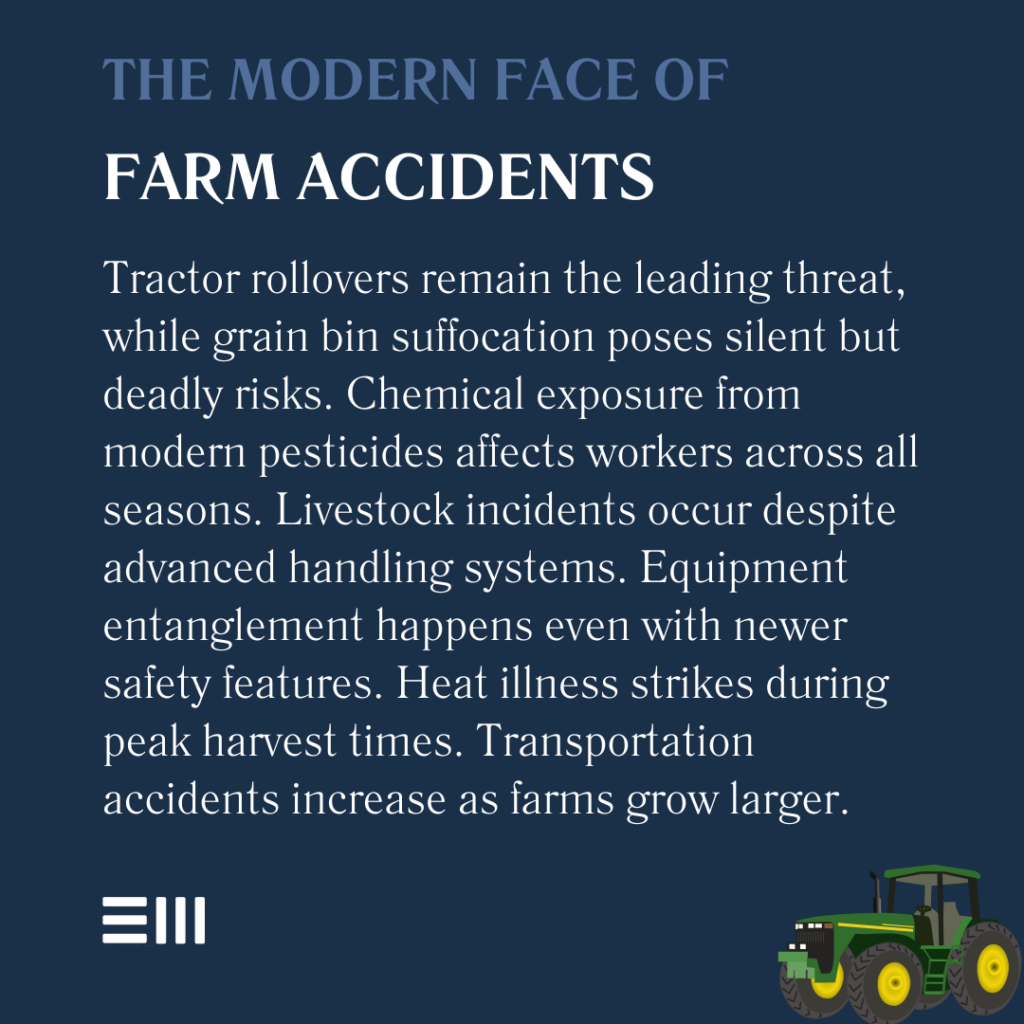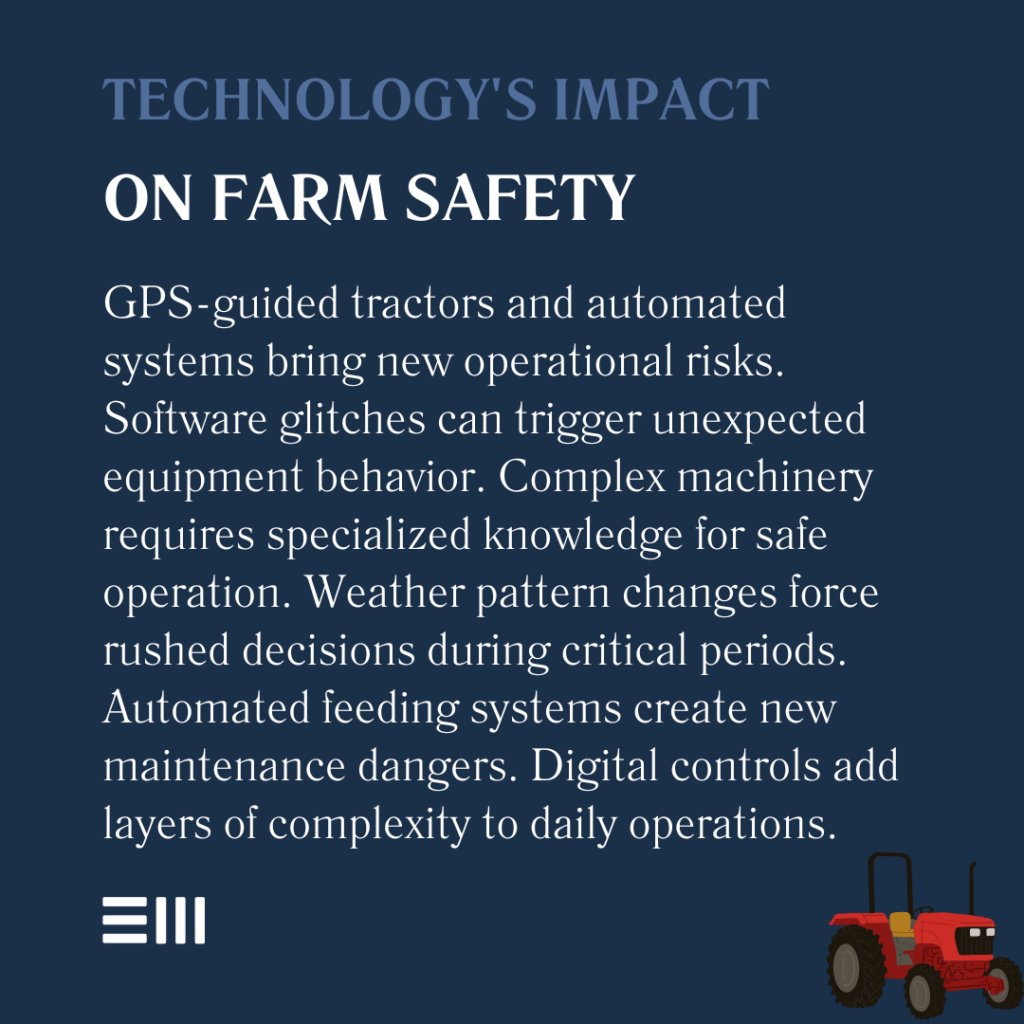
The rhythmic hum of tractors and the seasonal dance of planting and harvest mask a sobering reality of farm life—where every dawn brings not just the promise of growth but also the shadow of risk.
In Alabama’s rich agricultural landscape, families face daily decisions that balance livelihood with safety, often learning the true cost only when tragedy strikes.
Understanding Agricultural Accidents in Alabama
The diverse nature of farming operations creates unique challenges for safety and injury prevention. From large commercial operations to family farms, each setting presents its own set of risks and legal considerations.
Alabama’s agricultural landscape includes everything from sprawling cotton fields to small family vegetable farms, each with distinct operational hazards.
The combination of heavy machinery, unpredictable weather conditions, and time-sensitive operations creates an environment where even minor oversights can lead to serious injuries.
Farm workers often operate in isolation, far from immediate medical care and emergency services. This isolation magnifies the severity of accidents, as crucial minutes and hours may pass before help arrives.
Additionally, many agricultural operations involve multiple generations working together, creating situations where experienced workers must balance traditional methods with modern safety protocols.
Common Types of Farm Accidents
Modern farming combines centuries-old risks with new technological challenges.
Here are the incidents most frequently reported:
- Tractor rollovers and equipment malfunctions;
- Grain bin suffocation and entrapment;
- Chemical exposure from pesticides and fertilizers;
- Livestock-related injuries and trampling;
- Falls from heights in silos and storage facilities;
- Power take-off (PTO) accidents;
- Heat-related illnesses and dehydration;
- Equipment entanglement injuries;
- Loading and unloading accidents; and
- Transportation-related incidents.
These accidents often result from a complex interplay of factors, including weather conditions, equipment maintenance, and time pressures during critical farming seasons.

Risk Factors in Agricultural Work
The farming environment presents unique challenges that contribute to accident risks:
- Long working hours during peak seasons;
- Weather-dependent operations creating time pressure;
- Complex machinery requiring specialized knowledge;
- Isolated work environments limiting immediate help;
- Multigenerational workforce including elderly workers;
- Exposure to unpredictable livestock behavior;
- Varying terrain and environmental conditions;
- Limited access to immediate medical care;
- Financial pressures affecting equipment maintenance; and
- Seasonal worker training challenges.
Understanding these risk factors helps create more effective prevention strategies and stronger legal cases when accidents occur.
Legal Rights and Compensation Options
Agricultural workers in Alabama have specific rights and protections under the law.
The compensation process begins with understanding your legal position and available options.
Types of Available Compensation
Farm accident victims may be eligible for various forms of compensation:
- Medical expenses and ongoing treatment costs;
- Lost wages and reduced earning capacity;
- Equipment modification and accessibility needs;
- Pain and suffering damages;
- Rehabilitation and therapy expenses;
- Property damage compensation;
- Permanent disability benefits;
- Vocational retraining costs;
- Loss of quality of life damages; and
- Family support services.
Each compensation type addresses different aspects of recovery and future needs, creating a comprehensive support system for injured workers.
Workers’ Compensation Considerations
Special rules apply to agricultural workers’ compensation claims:
- Coverage requirements vary by farm size;
- Seasonal worker protections;
- Independent contractor classifications;
- Family worker exemptions;
- Filing deadlines and requirements;
- Medical treatment guidelines;
- Return-to-work programs; and
- Disability rating assessments.
Understanding these specific considerations ensures proper handling of your claim and maximum benefit eligibility.
Impact on Family Farms and Operations
Family farms face unique challenges when accidents occur. Unlike larger corporate operations, family farms often lack backup personnel to step in when someone is injured.
The loss of a key family member’s labor can trigger a cascade of financial challenges, from missed planting dates to delayed harvests.
Many families find themselves making impossible choices between proper medical care and keeping their operations running.
The psychological impact on farming families often goes unrecognized. Agricultural work is more than an occupation—it’s a way of life passed down through generations.
When injuries prevent farmers from participating in their usual roles, the emotional toll can be as devastating as the physical injuries.
Children who witness farm accidents may develop anxiety about continuing family farming traditions, while injured parents struggle with their inability to teach and mentor the next generation.

Common Questions About Farm Accident Claims in Alabama
When facing the aftermath of an agricultural accident, many victims and their families seek clarity about their rights and options.
These answers address the most pressing concerns.
How Long Do I Have to File a Claim?
The timing of your claim depends on several factors, including your employment status and the nature of the accident. Standard deadlines may be extended in cases involving ongoing exposure or progressive conditions.
What if I’m a Seasonal Worker?
Seasonal workers retain specific rights under Alabama law, including access to workers’ compensation benefits when employed by qualifying operations. Immigration status may affect certain aspects but doesn’t eliminate basic injury rights.
Can I Sue Outside of Workers’ Compensation?
Third-party claims may be possible when equipment manufacturers, contractors, or other non-employer entities contribute to the accident. These claims often provide additional compensation beyond workers’ compensation benefits.
How Are Medical Expenses Handled?
Medical coverage typically begins immediately after a qualifying incident, though proper documentation and reporting procedures must be followed to maintain benefits.
Building Your Recovery Plan
Creating a comprehensive recovery strategy involves multiple elements:
- Immediate medical care documentation;
- Incident report filing;
- Witness statement collection;
- Equipment inspection records;
- Environmental condition documentation;
- Training history verification;
- Safety procedure review;
- Medical treatment planning;
- Return-to-work assessment; and
- Long-term care coordination.
A well-documented recovery plan strengthens your claim and supports optimal healing outcomes.
Securing Your Agricultural Future
The path forward after a farming accident requires experienced legal guidance to navigate complex regulations and ensure fair compensation. Our team understands Alabama’s agricultural community and the unique challenges you face.
Contact us today for a confidential consultation about your farm accident claim. We’ll evaluate your case, explain your options, and help you make informed decisions about protecting your rights and future.
Can't find what you're looking for? Search our site below.










